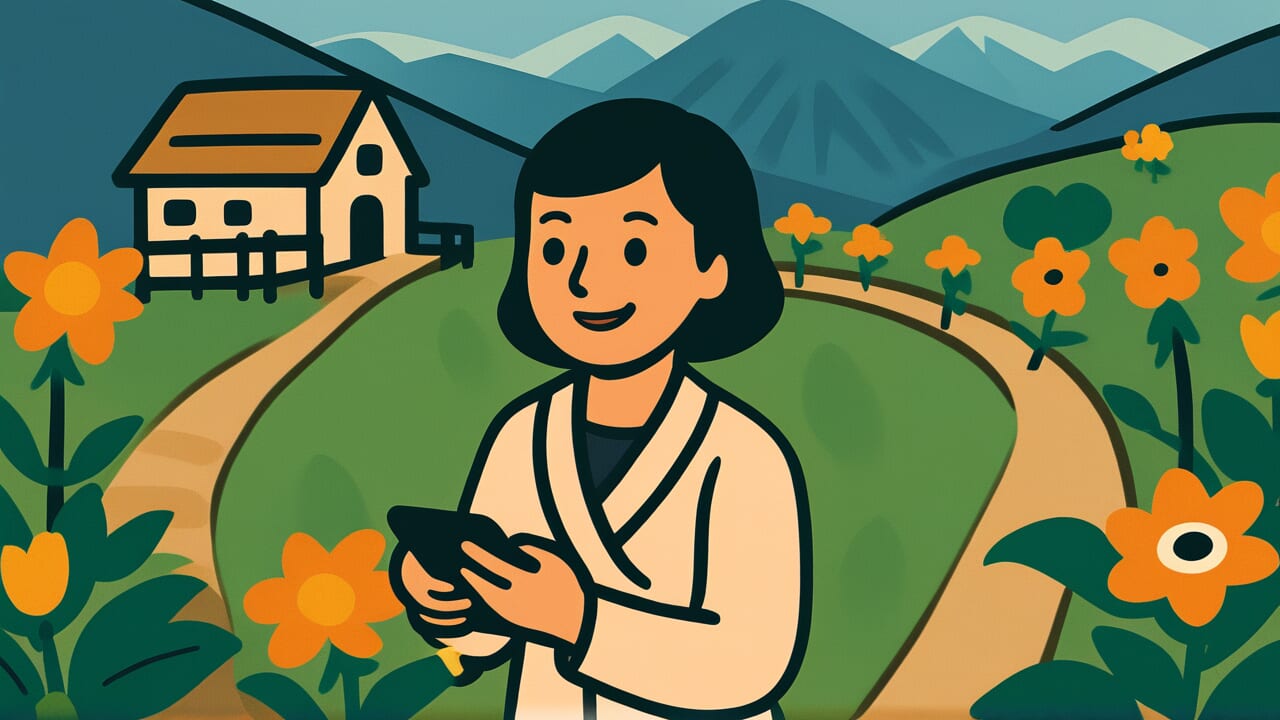How to Read “Flowers in the mountains, people in the village”
Hana wa yama hito wa sato
Meaning of “Flowers in the mountains, people in the village”
This proverb means that every being lives most naturally and beautifully in the place that suits them best.
Flowers bloom in their true form in the wild mountains rather than in artificial gardens. People live in their true form in villages where others gather rather than alone in remote mountains.
Through this contrast, the proverb expresses this fundamental truth.
People use this saying when someone is struggling in an environment that doesn’t suit them. It also helps those searching for a place where they can truly shine.
The proverb guides people moving from city to countryside or countryside to city. It reminds them of the importance of living in a place that matches who they are.
Today, people understand it as encouragement for those facing life choices about careers or where to live.
It teaches the importance of finding a place where you can shine as yourself. You don’t need to force yourself to match other people’s values.
Origin and Etymology
The exact first written appearance of this proverb is unclear. However, its structure shows how Japanese views of nature and life crystallized into a beautiful expression.
The first half, “flowers in the mountains,” carries deep meaning. Many flowers that Japanese people have loved, like cherry blossoms, plum blossoms, and yamabuki, originally grew wild in mountains and fields.
Flowers planted in villages are beautiful too. But flowers blooming in mountain nature have a different beauty. They have a wild, life-filled radiance that artificial beauty cannot match.
Mountain flowers endure wind and rain. They bloom in harsh environments. They can bloom most beautifully precisely because they are in that place.
The second half, “people in the village,” expresses insight into human nature. Humans are social creatures. We live through relationships with others.
Living alone in the mountains is possible. But living in villages, helping each other, nurturing culture, and raising the next generation is truly human.
This idea is embedded in the proverb.
This proverb concisely expresses Japanese views of nature and life. Each being has a place that suits them best.
It teaches the importance of living in the place most suitable for you. Don’t force yourself to change your environment unnaturally.
Usage Examples
- He quit his big company job and opened a small workshop in his hometown. Like “Flowers in the mountains, people in the village,” he seems much more alive now.
- I got tired of city life and started living in the countryside. But as “Flowers in the mountains, people in the village” says, I’m starting to miss interacting with people.
Universal Wisdom
Behind the proverb “Flowers in the mountains, people in the village” lies a fundamental question humans have always faced. That question is “Where should I live?”
Everyone searches for their place in the world. Sometimes, driven by longing or ambition, we aim for places that don’t truly suit us.
Longing for the city, desire for fame, seeking others’ approval. These feelings are natural human desires. But they don’t always lead to happiness.
This proverb shows a universal truth: the right person in the right place. Mountain flowers lose their wild beauty when transplanted to village gardens.
Conversely, humans living alone deep in the mountains cannot fulfill their nature as social beings. Each existence has a place where it shines brightest.
Our ancestors learned this truth by observing nature. Don’t force yourself to change your environment. Instead, understand your true nature and find a place that matches it.
This wisdom remains unchanged through the ages. Living without losing who you are is the most beautiful way to live.
This is what the proverb teaches us.
When AI Hears This
Mountain flowers and village people actually adopt opposite survival strategies. We can understand this as an optimization problem of resource allocation in ecology.
Mountain environments are harsh worlds with poor nutrients and short growing seasons. In such environments, flowers invest much energy in bright colors and fragrance.
For example, alpine plants have more vivid colors than lowland flowers. This ensures pollination in limited time. It’s a “short-term decisive battle” strategy.
If they fail, there’s no next chance. So they give their all to one reproductive effort.
Meanwhile, humans living in villages use a “long-term stability” strategy. They utilize stable resources and social networks.
Farming and cooperation take time. But once established, they generate sustainable benefits.
Living cooperatively in villages increases survival probability across your entire life, including child-rearing and old age, compared to isolated mountain living.
What’s interesting is that both are rational answers to their environments. Flowers planted in villages lose to competition. People isolated in mountains cannot handle crises.
This proverb shows that the optimal solution organisms derive from environmental constraints differs completely by species. Behind beauty lies mathematical calculations for survival.
Lessons for Today
This proverb teaches modern people “the courage to value being yourself.” In today’s world, we see others’ glamorous lives on social media. We push ourselves too hard trying to meet others’ expectations.
In this context, this teaching holds special importance.
You have a place where you shine brightest. It may not be what society calls “success.” It might be a small company instead of a big corporation. It might be the countryside instead of the city.
What matters is finding the place your heart truly seeks, not following other people’s values.
Continuing to work hard in an environment that doesn’t suit you is not a virtue. It’s like forcibly transplanting mountain flowers into a garden.
Sometimes you need the courage to change your environment. Changing jobs, moving, reconsidering relationships. You don’t need to fear such changes.
What’s important is understanding your true nature and continuing to search for a place where you can use it. There, you can bloom most beautifully, naturally and effortlessly.



Comments